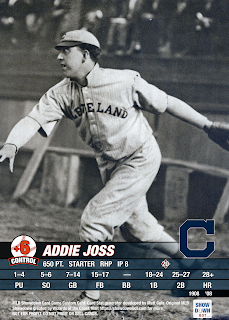Perfect Game - Addie Joss
There have been 7 perfect games in the last 20 years. For contrast, from 1880 when the first couple perfect games were pitched until 1956 when Don Larsen pitched the most famous game of all time, only 6 perfect games happened. Mind you, that the "Dead-ball era" the predated the Ruth power surge only accounts for 4 of the perfect games. So despite the huge offensive advantage the game contains today, there have been way more 27-up, 27-down games than in the era when offense was "dead". Food for thought.
The last of those dead-ball perfect games was thrown by one Addie Joss on October 2, 1908. His Cleveland Naps beat the Chicago White Sox 1-0. He needed only 74 pitches and struck out only 3 White Sox, both record lows for perfect games. Added to the thrill of the game was it was the home stretch of the season in which both teams were fighting with the Detroit Tigers for the pennant. Detroit would win in the end, and famously go on to lose to the Cubs in the World Series.
Joss has fantastic control and lasts 8 innings, with a chart that makes it obvious how he was able to pull off the perfecto. It also makes it clear how he was only able to strike 3 guys out.











